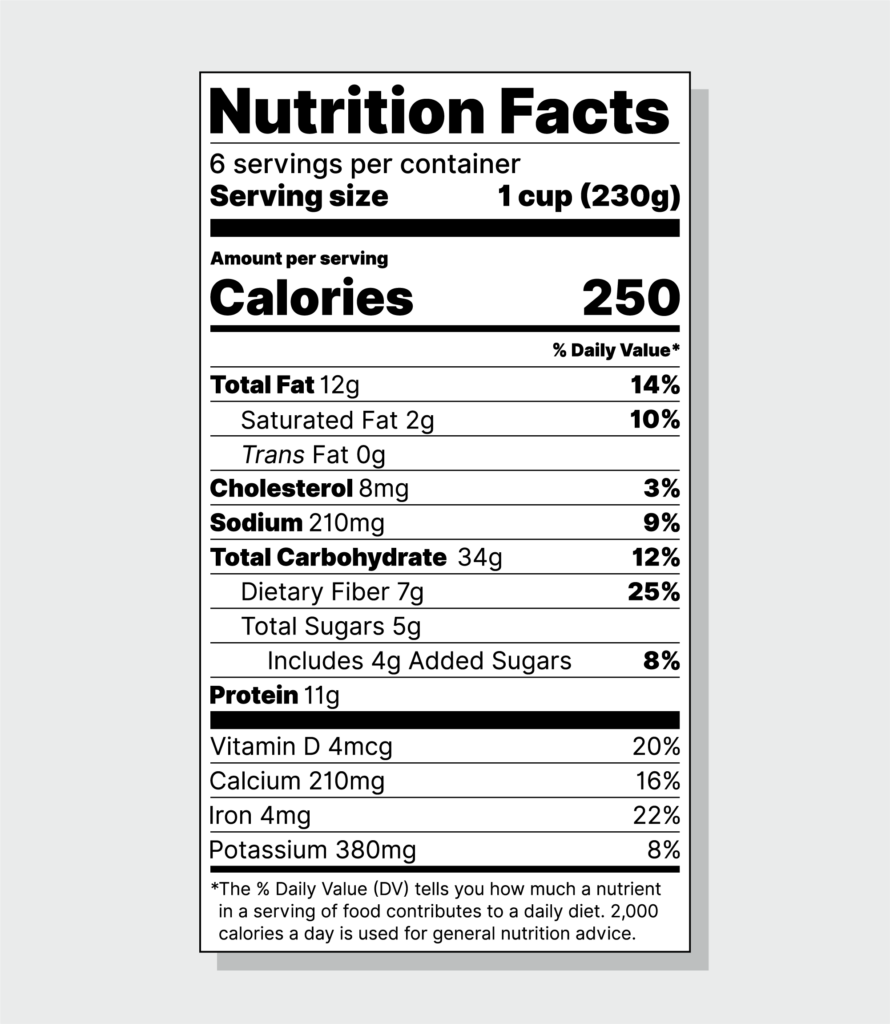Nutritional Labeling: What is It?
Nutritional labeling is a requirement from the FDA on most beverages and packaged foods. These labels, also called the Nutrition Facts label, show the nutrient content of a food product to consumers and guide them in food selection. For businesses involved in food production, nutritional testing is a crucial step in this process.
This labeling process has been around since 1913, initially for consumer protection. The law required food manufacturers to list their ingredients on every package, something akin to a primitive nutritional label.
The Nutrition Labeling and Education Act of 1990 expanded this concept by requiring the listing of nutrient information. Thus, nutritional testing became necessary to ensure accuracy. Nutrition labels now serve the following purposes:
- Provide information to help consumers make healthy choices.
- List nutrition facts that affect common health issues, such as diabetes and weight control.
- Serve as a guide for those on a specific diet.
The FDA also gives regular guidance to businesses in the food industry for any changes in labeling.
U.S. FDA Requirements on Your Nutritional Label

A nutritional label has 12 components, all verified through nutritional testing:
- Serving sizes and servings per package: This is the basis for all nutrition fact information on a label. Results from laboratory analysis use the standard measurement of units per 100 grams, expressed in quantities per serving.
- Calories: Regardless of the methods used to analyze calorie count, laboratories determine the sum before rounding them off.
- Total fat: This shows the total grams of fat in each serving, including all lipid fatty acids.
- Saturated fat: The sum of all “bad fats” responsible for increasing LDL cholesterol levels.
- Trans fat: Almost the same as saturated fat but lowers HDL cholesterol levels as well.
- Cholesterol: The cholesterol content measured in milligrams and rounded off to 5 mg per increment.
- Sodium: An essential mineral that helps maintain muscle contraction and fluid balance.
- Total carbohydrates: Indicates the sum of dietary fiber, sugar, and starches.
- Dietary fiber: This is a type of fiber that supports digestive health.
- Sugars: Listed in grams, this indicates the constituent sugars, which can be fructose, glucose, sucrose, maltose, and lactose.
- Protein: This nutrient helps to repair tissues and creates enzymes and other body chemicals.
- Vitamin D, potassium, and minerals: Measurement of vitamins and minerals that help to maintain consistent health.
The first item on this list counts as two components: serving sizes and servings per package. You can choose to add other optional details to your labels, such as folate, monounsaturated fat, and magnesium.
Advantages of Nutritional Labeling
Beyond FDA compliance, nutrition facts on your product bring several benefits to your business, all underscored by precise nutritional testing:
- Professionalism: Without a nutrition information label on your product, your company will appear unprofessional to consumers. They may even doubt your product’s effectiveness and instead choose your competitors’ products that have detailed labels on them.
- Transparency: Food labels help improve brand loyalty, especially with millennial consumers. Your sales may decrease if you don’t have nutrition information on your product.
- Marketing: Most health-conscious consumers read the information on your nutrition label. If they find that your product has a sufficient amount of nutrients they need, they’ll buy it and most likely recommend them to their friends and family.
The Value of a Nutritional Label: Not Just a Label, But a Trust Signal
Nutritional labeling and testing are essential components in running a business in the food industry. As said, the U.S. Food and Drug Administration (FDA) requires proper food labeling. This FDA guide to nutritional labeling is a great resource for food and beverage companies.
However, compliance with regulations is not the only goal of nutritional labeling and testing. The detailed nutritional information that comes from accurate nutritional testing builds trust among your consumers.
The transparency you provide with these labels shows your company’s honesty. Printing an allergen declaration on your labels also helps protect your business if a person allergic to one of your ingredients consumes your product.
However, before you can place the actual nutritional values, your product must undergo nutritional testing first.
Food Safety Net Services (FSNS) and Certified Laboratories, both Certified Group companies, offer complete nutritional facts testing that complies with current FDA guidelines. We also provide product-specific labels based on the results of our tests.
In addition to standard labeling, we offer many accompanying tests such as caffeine, amino acids, and other vitamins and nutrients.
Why FSNS is Your Go-To Analysis Lab for Nutritional Labeling & Testing
Our nutritional analysis labs can help accurately determine the amounts of vital ingredients in your products. We cover a broad scope of nutritional testing, including:
- Fat
- Protein
- Carbohydrates
- Calories
- Sodium
- Fiber
- Sugars
- Vitamin D
- Calcium
- Iron
- Potassium
Our North American network of 30+ ISO 17025 accredited labs have experts to guide you through nutritional testing and labeling of your products. Major brands in the food industry trust our nutritional testing services for various products, including food ingredients, commodities, vitamins, and dietary supplements.
Besides the competitive pricing we offer, we provide you with an option to request rushed turnaround times.
Adding More Value to Your Products with Nutritional Testing & Labeling at Our Nutritional Analysis Lab
Accurate nutritional testing and labeling go beyond FDA compliance. They also help build customer loyalty and trust in your brand. Even if your products pass chemical and food testing, you wouldn’t be able to show your products’ value without a nutritional fact label. Drop us a line to discover how our nutritional testing at FSNS and Certified Laboratories, top-tier nutritional analysis labs, can help you meet regulatory requirements and bolster your brand



